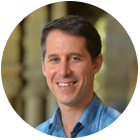Assessing social change in African countries

In Uganda, 95 percent of people say they would not like having a gay or lesbian neighbor. Could news of legal protections for the LGBTQ+ community in other countries sway public opinion on the issue?
That’s the question Nicholas Lyon, a recipient of research funding from the Stanford King Center on Global Development, set out to answer in a survey experiment conducted with more than 1,000 Ugandans in 2019.
In short, the answer was no.

In fact, messaging about LGBTQ+ protections in other African countries and in the United States seemed to create a backlash, causing the respondents’ opinion of those countries to go down.
For Lyon, a PhD candidate in political science, that finding is consistent with feedback he’s received from advocates working to secure LGBTQ+ rights in African countries.
“That tracks with the suggestion that a lot more investment in grassroots, local organizations is needed to build a localized understanding of what LGBTQ+ rights mean in the Ugandan context,” he explains.
Lyon’s research, which is under review for publication, is part of a broader exploration he is making into public opinion and attitudes in African countries. Some of his other work explores how urban residents in Kenya and Uganda compare to their rural counterparts on matters of social inclusion and inter-ethnic relations, and whether multi-ethnic citizens in Kenya and Uganda are more accepting of other ethnic groups than mono-ethnic individuals.

“Nic’s research tackles one of the longstanding questions in the study of political economy – how urbanization shapes political attitudes and intergroup relations – at a moment of tremendous growth in African cities,” says Professor of Political Science Jeremy Weinstein, Lyon’s advisor and a King Center faculty affiliate. “Using creative empirical methods and gathering original data, he seeks to unpack what it means to live in a city, thereby mapping how the characteristics of urban dwellers and the social contexts in which they live shape how they interact with the world around them.”
Lyon, the son of a violin professor and cello teacher who grew up in a college town in Pennsylvania, first became interested in African politics as an undergraduate student at Columbia University where one of his mentors was Kimuli Kasara, ’06 PhD. He later earned a master’s degree in African development at the London School of Economics and Political Science and worked for a year at IDinsight, which helps development organizations measure their progress.
At IDinsight, Lyon lived in Nairobi, Kenya, but spent three months in Ethiopia assessing whether a Gates Foundation project involving high-productivity chickens increased outputs for smallholder farms.
“That was a really valuable experience,” Lyon says. “I learned a lot about hiring and managing a team of data collectors.”
Living in Nairobi was also eye opening, he says, helping plant the seeds for some of his other research.
“My roommates and friends and acquaintances were people who were born and grew up in Nairobi,” he says. “There was this self-identification with a cosmopolitan, urban environment—a real acknowledgement of urban-ness as being distinct from individuals with a background in or family ties to rural areas.”

Lyon’s work on inter-group relations for multi-ethnic individuals and for people who are from urban or rural areas is still ongoing. He originally planned to conduct the survey in person in Kenya and Uganda, but the COVID-19 pandemic forced him to rethink those plans. Funding from the King Center helped him shift to phone surveys in both countries.
“The King Center’s financial support really made that project happen,” he says. “I was able to, on a dime, pivot from being on the ground to being able to run these surveys remotely.”
Data collection in Uganda continues, but he has analyzed some of the initial results from Kenya in both studies.
In the study on differences between urban and rural attitudes, for instance, Lyon’s research suggests that residents from both geographies have mostly similar attitudes about members of other ethnic groups. The major difference seems to be that urban Kenyans are more willing to have a politician of a different ethnic group represent them.
In the study on multi-ethnic individuals, data from Kenya suggests that multi-ethnic people and mono-ethnic people differ in two main ways: Multi-ethnic people are less attached to their native language and are more trusting of the ethnic groups that their parents are associated with (Kenya is generally a patrilineal society, so multi-ethnics mostly identify with their father’s ethnic group but are more tolerant of their mother’s ethnic group than are mono-ethnic people of a different ethnicity).
Lyon says his goal as a researcher is to have his work impact policy.
“I want to study things rigorously but not be so removed from policy importance as to be only writing for other academics,” he says.
Weinstein says Lyon’s research into the urban-rural divide is crucial.
“Understanding the impacts of urbanization is an essential priority for policymakers working on global development as they adjust to significant demographic changes across the continent,” he says.
Lyon was drawn to Stanford in part because of the experience of faculty who have “balanced the line between academic research and policy engagement.” Weinstein, for instance, served as director of development and democracy on the White House National Security Council under President Obama.
In addition to financial assistance, Lyon says the King Center has provided an “intellectual community.”
“To have access to people interested in international development, to speaker events, to networking, that’s been a really fruitful avenue,” he says.

